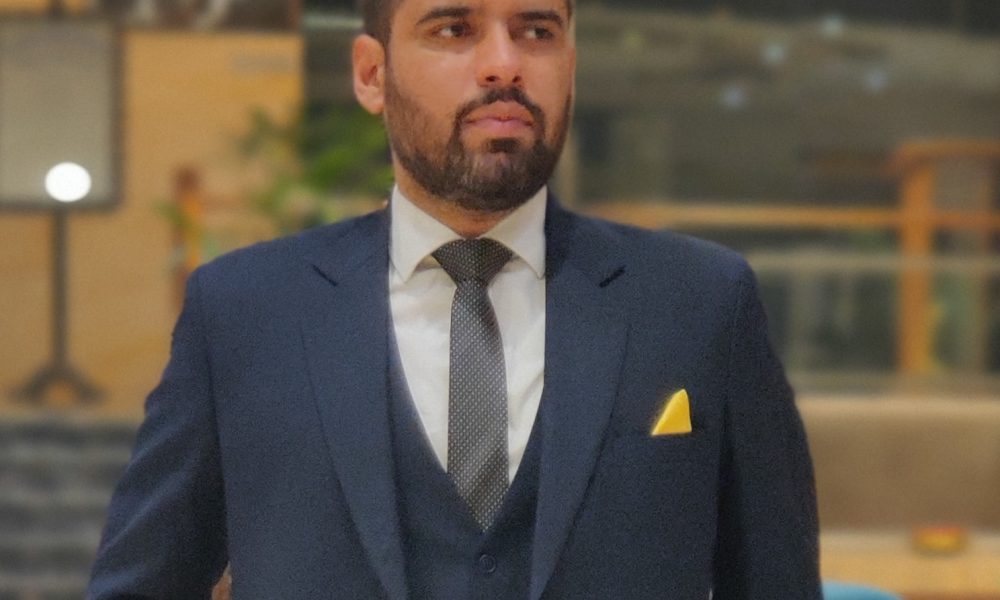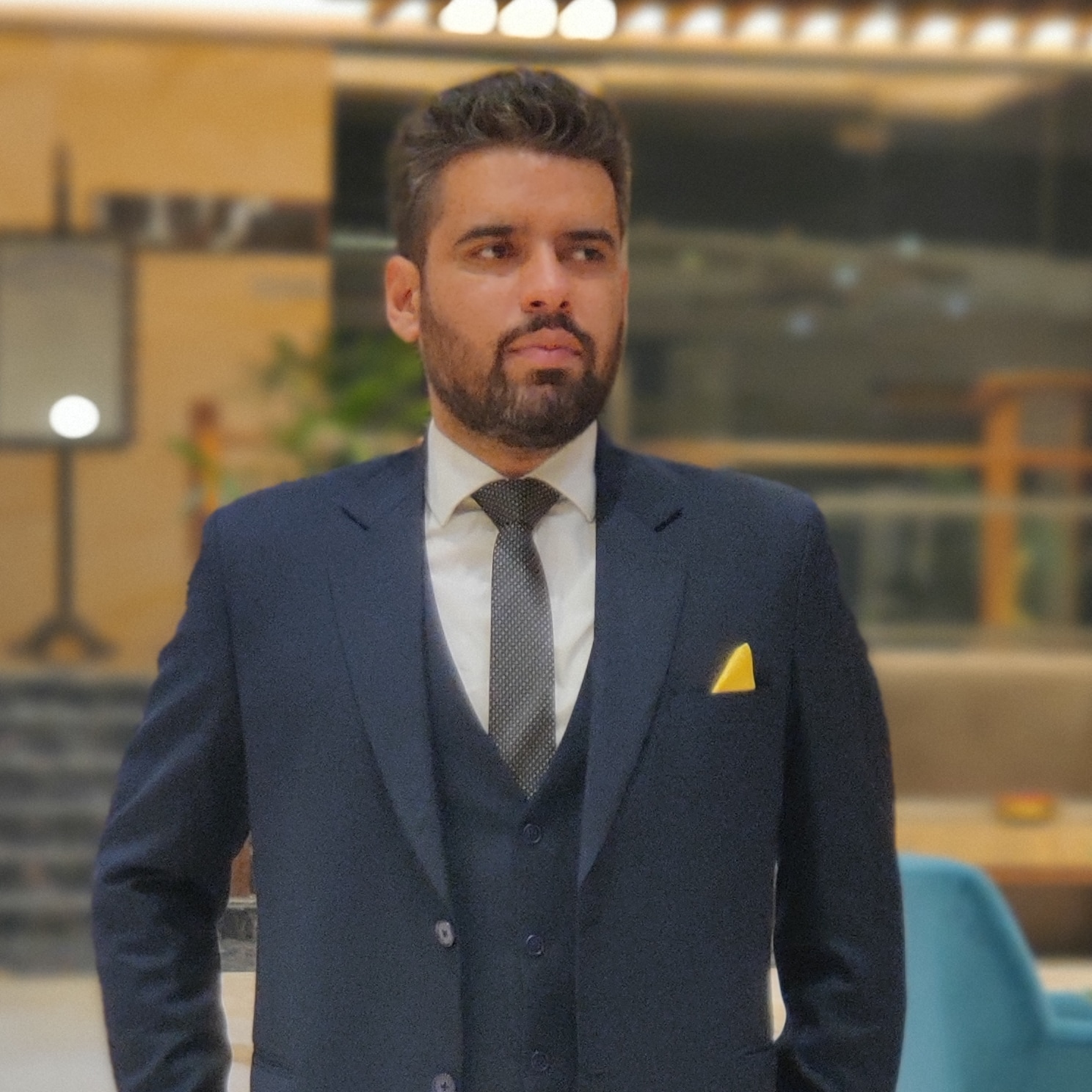This interview has been published by Priyanka Karwa and The SuperLawyer Team

Can you please share the story of how you embarked on your journey in law, from your days at National Law University to opening your own law firm, ‘YHprum Legal’ and establishing your practice in Delhi being a first-generation lawyer?
To start with, I come from a family of engineers and pursuing law was never a consideration during my school time. However, on advice of a family friend, I visited NLU Jodhpur and from there I was intrigued in law (as a probable career option), in the year 2006. I was enthralled by the environment & culture of NLU and after contemplating possible future opportunities in the field of law, decided to appear in the law entrance examination.
At that time, in the pre-CLAT era, each NLUs conducted their own entrance examination. Hence, I appeared for the entrance exams and got selected in the Rajiv Gandhi National University of Law (RGNUL), Punjab in the year 2007 for a five-year integrated B.A., LLB course.
Speaking of initial days at Law school, I must say that it was a whole roller-coaster, from studying different branches of law to participating in Moot court competitions, to preparing research projects and multiple seminar presentations to then applying for internships! With so much to do and learn, those five years went by in a flash and shaped my personality in a way that changed my perspective towards life.
After completing the Law in 2012, I was selected for a prestigious Judicial clerkship in the Supreme Court of India, wherein, I was assigned to the office of HMJ Dipak Mishra (Former Chief Justice of India). While working for the Bench at the highest level for a considerable time-period, later on, I decided to join the litigation and joined the Chamber of Mr. Gopal Jain, Sr. Advocate, Supreme Court of India, as litigation associate thus embarking on my journey in the field of litigation in Delhi.
Being a first-generation advocate and an outsider for Delhi legal circles, I was also inclined to join a Tier-I dispute resolution firm in Delhi for financial stability and professional growth, just like every second lawyer.
The thought of going independent, establishing my own law firm was intimidating and a distant dream at that time. But destiny had different plans and the path was already chosen for me!
After learning some basics of law & litigation at the Chamber of Mr. Jain, I started my independent practice before the Supreme Court, Delhi High Court, and various other tribunals for a few months with limited financial resources, zero clientele at hand and without any support or mentors. As a first-generation advocate, had his own share of struggles and difficulties, and it takes a whole lot of perseverance to survive the initial turbulent years of independent litigation practice.
The only strength that kept me going through that period was the consistent support of my colleagues from the Bar and my law school batch mates and friends, who were practising before different courts across the country and referred briefs to me in Delhi.
I was well aware that starting and running a law firm is not without its challenges, including competition, financial considerations, administrative responsibilities, and the need for marketing and business development.
After gaining some experience as an independent litigator, I, along with my colleague, Akanksha, decided to launch our Law firm, ‘YHprum Legal’, which means “Everything that can work will work”, it is ‘Murphy’ spelled backwards. The motive behind this move was to provide personalized, client-centric legal services, wherein, we can have client-focused practice that prioritizes individual needs and attention, with our expertise.
You’ve had a diverse legal career, working with prominent legal professionals and in various areas of practice. Could you highlight a few pivotal moments or experiences that significantly shaped your legal career?
I must admit that I did not choose the brief/case or court, they were referred to me and I accepted them all with a challenge to perform to the best of my ability.
All the briefs/cases that came my way were from different branches of law. As an independent litigator, you don’t really have an option of choosing the briefs or the area of practice. Fortunately or unfortunately, since the beginning of my litigation career, I had the opportunity to appear before different courts and forums, i.e., Supreme Court, Delhi High Court, and district courts, NCDRC, TDSAT, APTEL, CERC, NGT, NCLAT, NCLT, Arbitral Tribunals etc.
Appearing before a specialised Tribunal, such as APTEL, TDSAT, NCLAT & NGT, helped in expanding my horizon and understanding of the subject matter.
Highlighting a few cases that played a significant role in shaping my diverse legal career, naming a few of those, are as follows:
- One of the intense legal battles that I was part of, TDSAT, was hearing AGR dues case wherein all the telecom companies challenged the validity of levy of license fee by TRAI, which was ultimately decided and settled in the Supreme Court. This intense legal battle has made me understand the nuances of telecom law.
- Another case pertained to cancellation of AIPMT due to large scale irregularities in which a historical judgement was delivered by the Supreme Court by cancelling the examination on our plea.
- Then, a large-scale irrigation project in the state of Telangana was also challenged by us due to violation of various environmental norms before the National Green Tribunal and subsequent to the Supreme Court;
- I had the opportunity to work on the Ansal brothers (Uphar cinema fire) case, on quantum of sentence before the Supreme Court along with legal tycoon, Late Sh. Ram Jethmalani, the case preparation had forced me into sleepless nights.
- In the Supreme Court the national newspaper were faced with contempt proceedings for non-implementation of Majithia wage board recommendation, wherein, we had to justify the non-action by the client and difficulties to implement to the committee report ;
- I had been part of numerous mining lessees matters under the MMDR Act arising out of the state of Goa, wherein, the State Govt. had terminated the lease deed of various mining lessees due to non-compliance of Supreme Court direction in the landmark Goa foundation judgement.
- Post cancellation of Coal blocks by the Supreme Court, various mining lessees had to fight hard for deemed renewal under Section 8A of the MMDR Act in various High Courts i.e. Delhi, Odisha and Jharkhand.
- Recently, we were representing home buyers before the Supreme Court on application of MOFA Act and RERA in relation to deemed or blanket consent for additional structure to be constructed by the Builder.
- One of the highly contested litigation is the effective implementation of All India Quota in PG courses for AIPMT/NEET aspirants, which we keep doing as and when the situation arises.
The above list is just an indication, wherein, the dispute or the judgment had made significant impact by laying down legal principles of constitutional importance.
As the founder and managing partner of ‘YHprum Legal’, you handle a wide range of cases, including arbitration, civil and criminal litigation, and commercial disputes. Can you tell us about a particularly challenging case that you’ve worked on and the lessons you learned from it, especially during COVID time?
The firm was founded in the most turbulent times that the world was seeing at that time, the COVID Pandemic. Due to the national lockdown wherein the courts were also shut, we were facing a complicated and unimaginable situation, the Indian Courts were embarking a new tech-era through virtual hearings and e-courts across the country.
Our advisory work during lockdown increased exponentially, wherein, we were answering numerous legal queries regarding the effect of lockdown on the clients’ cases and business. The notifications issued by RBI for moratorium and by local governments in relation to rental payments and employee payments required interpretation by the Courts. All pending arbitration were made virtual or adjourned indefinitely. The limitation period was extended by the Supreme Court. There was a sudden death in regular appearances due to adjournments and sudden fall in fresh matters filing.
It became difficult to get relief in regular pending matters due to non-listing. We had multiple arbitration proceedings pending at various levels in different courts or arbitral tribunals and clients were getting restless due to decline of urgent hearing or relief by the Courts. It took a while for us to settle down and make peace with the lockdown and its aftermath.
The Supreme Court passed an order for the release of under trials which created havoc across the country for the execution. We had to approach the Supreme Court through IA for implementation of the order in favour of our clients due to reluctance shown by the local authorities and Courts. Due to a sudden health emergency, we had to approach different Courts for regular and anticipatory bails for our clients, which at that time was a herculean task. Our existing clients were seeking legal opinion on application of force majeure on a daily basis. All physical meetings shifted to virtual meetings, which now have become a norm in our office.
The ever-changing regime of arbitration has become a major challenge for all of us. Every day the Courts are coming with different judgments with reference to interpretation of the Arbitration act provisions. The recent Constitution bench judgment on the stamping of the arbitration agreement and followed by a detailed judgement of Delhi High Court in the NHAI case had changed the scenario overnight. The IBC, 2016 being a new law is getting a makeover on a daily basis, which has become a different game altogether.
Representing homebuyers, post the enactment of the RERA, IBC and new Consumer Protection Act, 2019 had caused unwarranted confusion among the homebuyers about their status and forum hunt for appropriate relief. The Supreme Court judgments on anticipatory bail have no universal application and each bench has their own set of rules and consideration, which put the advocates in a perplexing situation to make clients understand if bails are getting rejected by the SC. A new phenomenon of putting strange bail conditions in matrimonial matters is making our work harder to get relief for our clients.
Each case has its own merits and demerits, and we are learning with each brief that is coming to us. In my more than eleven years of journey into litigation in Delhi, every appearance has been a learning experience, though sometimes we won our battle and sometimes lost it. But each brief leaves memory and is an experience, which motivates us to work harder, smarter and faster making survival possible in this continual race of successful litigators with client satisfaction.
In addition to your legal practice, you also serve as a judge for international moot court competitions. How has this experience influenced your perspective on legal education and advocacy?
During my law school, I had participated in a few moot competitions in which I played the role of a speaker as well as a researcher. I then realised that being a speaker in the moot competitions is not really my cup of tea and I was more comfortable in research & drafting. However, as an advocate, although initially I was hesitant to judge the moot competitions but eventually started enjoying the whole process of interacting with the participants and guiding them further. I had the honour to judge the international rounds and national rounds of the Jessup moot competition multiple times. I have now participated almost in every international moot court competition either as an arbitrator or judge viz., Willem C. Vis Moot (Vienna & Hong Kong), ICC trial, Frankfurt Moot, FDI Moot, Cross Examination Moot and various pre moots across continents.
During my journey as a judge for various international moot court competitions I had learnt various aspects of international law, commercial arbitration, investment law, international criminal law etc. Due to my extensive representation in different international moots, I am receiving multiple requests for support and assistance as a coach by different law (domestic and international) schools regularly, thereby complying to most of the requests.
I firmly believe that participation in such competitions is necessary for the law students during their law school because it would eventually help them in preparing for the art & craft of advocacy.
I think Indian legal education needs a revamp to realise the current reality and the same cannot be restricted or limited to bookish knowledge. The new emergent legal regime such as crypto currency, bitcoins, data protection, sports law, privacy law, AI, online ADR and emerging new technology needs to be taught in law school as part of their curriculum. The legal regime is changing with the speed of light and therefore, the law schools also need to catch up with the same to be at par with the real-time advocacy.
Your practice covers a wide array of areas, including constitution, arbitration, commercial disputes, and more. Is there a specific area of law that you find particularly fascinating or challenging, and why?
As you rightly mentioned, I have a whole diaspora of practice while appearing for my clients before various courts and forums. As I stated earlier, I had not selected my cases or had the privilege to select my clientele, therefore, it is very difficult to now admit or say which branch or specific area of law I find fascinating. But I can now confess, my most favourite part is appearing before the Supreme Court.
In the Supreme Court, the advocates are like all-rounder players who draft a wide range of petitions i.e., special leave petitions, writ petition, transfer petition, arbitration petition, civil and criminal appeals and sometimes contempt petition and review petitions.
To answer the question, commercial litigation before any Court or Tribunal fascinates me as I find it exhilarating. Now after spending a good number of years in litigation, I had realised that arbitration matters, IBC related matters and disputes arising out of special laws i.e. RERA, Electricity Act, Telecom Law, and Consumer Protection are always challenging.
You’ve represented clients in various high-profile cases, including matters related to home buyers, sexual assault victims, and constitutional validity. Could you share some insights into the strategies and approaches you employ in handling such sensitive cases?
The term ‘high-profile’ cases has no meaning in actual litigation. Every case is high profile for us. Our work strategy or approach is not different due to involvement of a high-profile individual or big amount. I had recently, represented a victim of gang rape before the Supreme by filing cancellation of bail application. The details of the case had shocked our conscience. We were shocked to see that the identity of the victim is disclosed everywhere by the local authorities, Trial Court and the High Court. We had to seek specific direction from the Supreme Court to redact her name from all court records.
Introduction of RERA and IBC has changed the legal scenario. While appearing in RERA, we had a different strategy in place if a case needs to be filed in UPRERA or HRERA. We prepared a ‘to do’ chart from filing till final grant of relief. The orders of RERA are paper decree and need special litigation strategy for enforcement, sometimes by approaching the High Court. We are representing home buyers under IBC, at different stages of the Insolvency before various NCLTs. The Supreme Court, post Judgement in Amrapali and post constitutional validity of the IBC, had settled law to certain crucial issues in favour of the home buyers, which eventually led to multiple litigation also. The challenge to constitutional validity of CAA is still pending in the Court, therefore, it would be difficult to divulge into that in more details.
There is no specific strategy or approach while handling sensitive cases. The facts speak for themselves, we make sure all facts are verified through documents and correctly represented in our drafts before filing. Our work is very client centric, wherein, we update our client about regular court proceedings as well our line of action. We believe that the client is first & foremost and it is ensured that the client is heard properly and advised as per law, to the best of our ability.
As a writer and columnist for legal publications, you have a keen interest in legal commentary. Are there any current legal issues or trends in India that you find particularly noteworthy and would like to share your perspective on?
I am quite inquisitive about the Supreme Court Judgements and make sure that in my free time I read them and if possible, share my views through social networking or by writing articles or commentary.
The recent development in the arbitration law is worrisome and will work against our country’s official position of being an arbitration friendly nation. The judicial interference or intervention in arbitration matters especially in Section 34 and 37 proceedings needs a revisit by the legislature.
At times, the Supreme Court judgements/orders are contrary to already settled legal positions and passed by ignoring the previous precedents which is a dangerous proposition.
The decision of the Constitution bench in the demonization case had set a wrong precedent by going against the settled legal position in relation to RBI’s power and involvement of the Central Government by announcing the same in hurry without any application of mind.
The Maharashtra CB Judgement had failed to lay down any legal position and indirectly supported and gave a stamp of approval for dethroning an elected government by money power.
I firmly believe that the State should not enter into the personal space of an individual and privacy must be respected as per the scheme of the Constitution.
The Supreme Court refusal to hear cases of individual liberty and matters of national importance has created a doubt on authority of the Court. I feel that the Supreme Court cannot be a CJI centric Court and the administrative side also needs to be run through a consultation process of the senior most judges. The ‘Master of the Roaster’ power given to the CJI must be reviewed and individuals cannot be given an absolute power, which can compromise integrity of the Institution.
I must laud the various measures taken by the current CJI DYC for making the court more litigant centric and approachable for a common man. The virtual hearing needs to be made permanent and not optional on behest of the Court. The litigant and advocate must be given the right to choose how they want to appear in the Court.
The enactment of the Mediation Act and Digital Protection Act and establishment of different arbitration centres across the country is a welcome step in the field of law.
Given your extensive experience in the legal field, what advice would you offer to recent law graduates who are starting their legal careers, especially those interested in litigation and dispute resolution?
I consider myself as a student and try to learn everyday through different modes. Despite spending a considerable time in litigation and dispute resolution, I still go to the Court just to hear the arguments of the Counsel, whenever some important matter of national or constitutional importance is going on. I had also enrolled myself for various mentor mentee programs offered by multiple platforms. I interact with law students and share my experience with them by telling do’s and don’ts before entering litigation with my little experience.
In today’s AI centric world, the legal profession is also not immune from its impact. Adoption of technology and usage of social networking is a key to survival for a better future to all those who are planning to enter this profession. Young lawyer’s must do networking and interact with their seniors and colleagues in the profession for guidance.
All those who are planning to enter litigation as a first-generation lawyer or an outsider, start networking from college days itself and try to get internships from those places wherein you seek future opportunity post law school. Get accustomed to technology and AI and try to be updated with the latest legal news around you. If you are curious and patient, you will surely survive in this profession.
I feel that Delhi as a place for advocates is full of opportunities and there is work for everyone, even though the competition is tough, the best will survive and grow gradually. Patience, perseverance, optimism and inquisitiveness are the key factors for survival in the litigation.
Lastly, considering your diverse legal background, what are your future aspirations or goals in the field of law, and how do you plan to continue making an impact in the legal profession in India?
We are growing gradually with help and assistance from all our well-wishers. Our aim is to continue making a difference in people’s lives through our legal work and assist all our clients to get them appropriate relief effectively.
I am planning to continue my contribution to legal education and advocacy by teaching law students in law schools and writing on legal issues to advance knowledge and promote legal research and writing.
I will continue to promote alternative dispute resolution (ADR) as an alternative to resolving issues through mediation and arbitration which can help reduce the burden on courts and promote quicker, cost-effective resolution of disputes for everyone.
I am a firm believer of sharing legal knowledge by teaching and mentoring law students and young lawyers which will ultimately help shaping the future of the legal profession.
Get in touch with Vaibhav Choudhary-


























